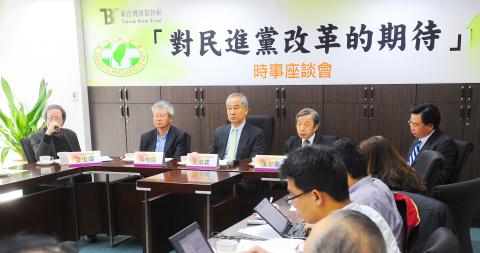The Democratic Progressive Party (DPP) needs to forget about the 2016 presidential race and focus instead on reforming the party and rediscovering the core ideals that made it popular with the Taiwanese public in the past, panelists said yesterday at a forum to discuss the future direction of the DPP.
“While winning the presidency is important, it is impossible for the DPP to return to power if all it thinks about is the elections, because it is now at a disadvantage because the political environment is dominated by a heavy Chinese influence,” political commentator Chin Heng-wei (金恆煒) said at the forum organized by the Taiwan Brain Trust think tank.
Chin said the DPP has always been more advanced and progressive than the Chinese Nationalist Party (KMT) in terms of its connections to social movements and its espousal of universal values, such as human rights.

Photo: Wang Min-wei, Taipei Times
However, the party lost the Jan. 14 presidential election because it lost touch with the public, Chin said, and not because of its stance toward China, as other commentators contend.
Chin said pursuing a strategy of developing closer ties with Beijing should never be on the DPP’s list of priorities.
“Regardless of how hard the DPP tries to appeal to Beijing, it will never defeat the KMT on cross-strait relations because the DPP will never be a ‘second KMT,’” he said.
Joseph Wu (吳釗燮), who served in the DPP administration of former president Chen Shui-bian (陳水扁) as Mainland Affairs Council chairman and representative to the US, agreed that cross-strait policy was not the reason the DPP lost the election.
If the DPP reaches that conclusion, the party will fall into a trap set by Beijing, Wu said.
“That is exactly what China wants you [the DPP] to think,” he said, adding that the DPP’s resolution on Taiwan’s future is “alive and kicking” and is able to meet any future challenges.
The DPP does not oppose closer engagement with China outright, but it insists that any exchanges should take place in a framework that safeguards Taiwan’s sovereignty and dignity. Former DPP chairperson Tsai Ing-wen (蔡英文) had listed the Strait Forum and the Western Taiwan Straits Economic Zone (海西經濟區) off-limits for DPP members, saying that they come with united front implications.
The DPP does not need to re-invent itself, Wu said. It simply needs to be a respectable opposition party and to keep hammering away on the issues it has traditionally cared about, such as the KMT’s ill-gotten party assets, media reform, judicial reform and fair elections.
The DPP should abandon the short-term goal of winning specific elections and devise a long-term vision and strategy, said Chang Yen-hsien (張炎憲), president of the Taiwan Association of University Professors.
Wu Shu-min (吳樹民), president of the pro-independence Taiwan Society, said the DPP needs to be confident in the values it believes in before it can win the public’s trust again.
“Perhaps we — civic organizations — should not be the DPP’s faithful cheerleaders so that the party is forced to carry out reforms and make changes,” Wu said.

An essay competition jointly organized by a local writing society and a publisher affiliated with the Chinese Communist Party (CCP) might have contravened the Act Governing Relations Between the People of the Taiwan Area and the Mainland Area (臺灣地區與大陸地區人民關係條例), the Mainland Affairs Council (MAC) said on Thursday. “In this case, the partner organization is clearly an agency under the CCP’s Fujian Provincial Committee,” MAC Deputy Minister and spokesperson Liang Wen-chieh (梁文傑) said at a news briefing in Taipei. “It also involves bringing Taiwanese students to China with all-expenses-paid arrangements to attend award ceremonies and camps,” Liang said. Those two “characteristics” are typically sufficient

A magnitude 5.9 earthquake that struck about 33km off the coast of Hualien City was the "main shock" in a series of quakes in the area, with aftershocks expected over the next three days, the Central Weather Administration (CWA) said yesterday. Prior to the magnitude 5.9 quake shaking most of Taiwan at 6:53pm yesterday, six other earthquakes stronger than a magnitude of 4, starting with a magnitude 5.5 quake at 6:09pm, occurred in the area. CWA Seismological Center Director Wu Chien-fu (吳健富) confirmed that the quakes were all part of the same series and that the magnitude 5.5 temblor was

The brilliant blue waters, thick foliage and bucolic atmosphere on this seemingly idyllic archipelago deep in the Pacific Ocean belie the key role it now plays in a titanic geopolitical struggle. Palau is again on the front line as China, and the US and its allies prepare their forces in an intensifying contest for control over the Asia-Pacific region. The democratic nation of just 17,000 people hosts US-controlled airstrips and soon-to-be-completed radar installations that the US military describes as “critical” to monitoring vast swathes of water and airspace. It is also a key piece of the second island chain, a string of

The Central Weather Administration has issued a heat alert for southeastern Taiwan, warning of temperatures as high as 36°C today, while alerting some coastal areas of strong winds later in the day. Kaohsiung’s Neimen District (內門) and Pingtung County’s Neipu Township (內埔) are under an orange heat alert, which warns of temperatures as high as 36°C for three consecutive days, the CWA said, citing southwest winds. The heat would also extend to Tainan’s Nansi (楠西) and Yujing (玉井) districts, as well as Pingtung’s Gaoshu (高樹), Yanpu (鹽埔) and Majia (瑪家) townships, it said, forecasting highs of up to 36°C in those areas